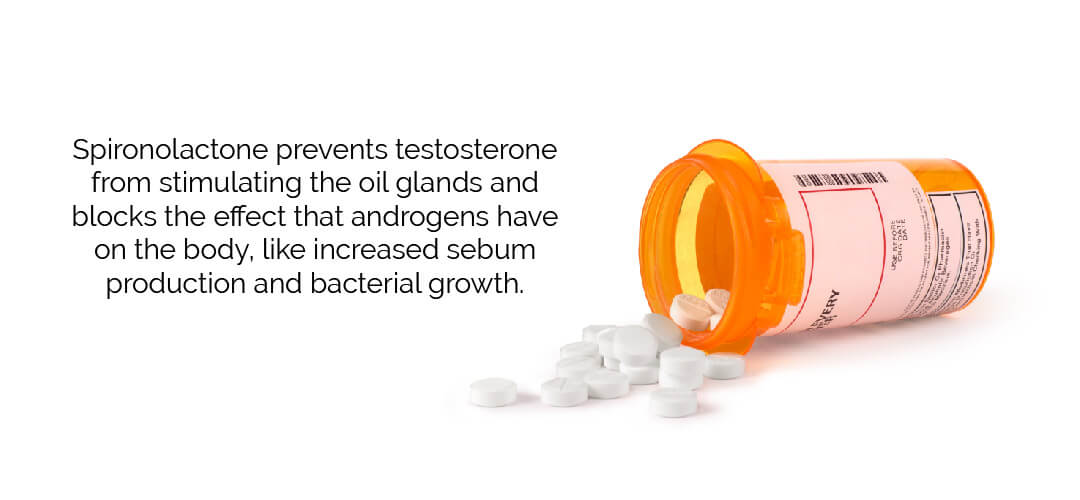Acne comes in all different forms and can have a multitude of different causes, ranging from hormonal to bacterial to genetic. Because of this, it can be tricky to treat with your typical over-the-counter topical serums and gels. That is where prescriptions like oral contraceptives, Spironolactone, and Accutane come in.
Birth Control
Researchers believe that androgens, which include the male hormone testosterone, are what causes acne. The subcutaneous layer of the skin, where sebum is produced, is particularly sensitive to androgens. And when androgens are in excess, it causes an increase in sebum or oiliness that clogs pores and, in combination with dead skin, causes acne (Skin Therapy Letters).
In order to control these hormone levels, women are turning to birth control and seeing great results! One such study found that Ortho Tri-Cyclen Lo reduced acne by 46.4% when compared to 33.9% with placebo (Obstetrics and Gynecology). Several other studies have also shown promising results using oral contraceptives to reduce acne (Contraception). And these results aren’t just applicable to one brand either, no low dose of birth control has been found to be more effective at reducing acne than another (Cutis). If androgens were the cause of acne flare-ups, the reason would be because the subcutaneous gland — which sensitive to androgens — produces an excess of sebum that clogs the pores and causes acne (Skin Therapy Letters).
Going off birth control could cause acne to flare up again as your hormone levels even out. If you’re thinking of going off birth control be sure to talk to your dermatologist and come up with a treatment plan if this occurs.
Spironolactone

Spironolactone is an effective, but not often discussed, treatment for stubborn hormonal acne. It is not specifically designed for acne and was originally created as a treatment for high blood pressure and heart failure.
However, it has become more of a go-to medication for acne treatment because it prevents testosterone from stimulating the oil glands. Similar to birth control it blocks the effect that androgens have on the body, like increased sebum production and bacterial growth. Spironolactone takes about three months to really start working and give you visible results so it’s important to remain patient. Another benefit to Spiro is that there’s no time limit to how long you can take the drug, unlike other acne medications like Accutane.
Accutane
Accutane is the brand name, which has been discontinued but the name stuck, for an acne drug called isotretinoin. Isotretinoin is a derivative of vitamin A and it treats acne by decreasing the amount of oil production released by the sebaceous glands, shrinks the oil glands, and kills acne-causing bacteria. It can also provide a long-term decrease in acne once the treatment plan is completed. A typical Accutane treatment plan can be anywhere from three to six months depending on the severity of the user’s acne. You should talk to your dermatologist about going on Accutane if you have exhausted all other acne treatments. This includes topical creams and the medications listed above.
During your treatment plan, don’t be surprised if you experience some mild to moderate side effects. The higher your dosage is, the more common these side effects may be. Some side effects include:
-
Dryness, everywhere. This is the most common side effect users experience so be sure you are using a heavy-duty moisturizer and drinking lots of water.
-
Acne can worsen before improving
-
Nosebleeds from dry nasal mucosa
-
Bone, muscle, or joint pain (may be mild or severe)
-
Increased sun sensitivity
-
Increased muscle tenderness
One of the biggest risks of taking Accutane is birth defects, so women who are pregnant or trying to get pregnant should avoid it at all costs! According to the Organization of Teratology Information Services (OTIS), women who take Accutane during the first twelve weeks of pregnancy risk severe birth defects. These include severe fetal brain and heart defects, mental retardation, and other birth abnormalities. The correlation is strong, with one in four babies exposed to Accutane drug during the first trimester of pregnancy experiencing severe birth defects. Fortunately, according to the New England Journal of Medicine, the percentage of Accutane users who are advised about potential birth defects is high: 99 percent of 177,216 women prescribed Accutane recalled being instructed to avoid pregnancy (New England Journal of Medicine, 1995). Women who are taking Accutane and plan to become pregnant are advised by OTIS to stop using the product one month before trying to get pregnant, to be absolutely sure that the product is gone from the bloodstream.
So that all sounds pretty scary, but, Accutane has proven to be an incredibly effective treatment for those who are struggling with acne and have tried every other treatment available. If you’re concerned, be sure to talk to your dermatologist. They will be able to answer all your questions and ease your mind.
Bottom Line
If you have tried every topical treatment on the market and you’re still struggling with acne, talk to your dermatologist about going on prescription medication such as Accutane, Spironolactone, or low-dose birth control like Ortho Tri-Cyclen Lo.

